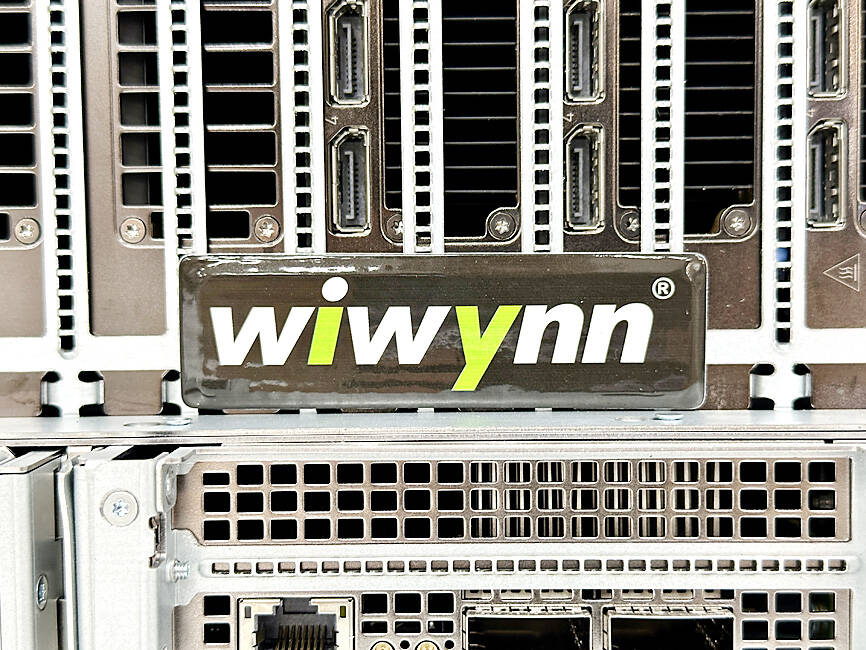Compal Electronics Inc (仁寶), Wistron Corp (緯創) affiliate Wiwynn Corp (緯穎) and US company Jabil Inc are set to submit revised offers for Advanced Micro Devices Inc’s (AMD) artificial intelligence (AI) server assembly plants, people familiar with the matter said.
Inventec Corp (英業達) and Pegatron Corp (和碩), which Bloomberg News previously reported were also interested in the assets, have since dropped out of the bidding, said the people, who asked not to be identified because the information is private.
AMD, which is working with an adviser, has called for refreshed bids to be submitted in the coming days, the people said.

Photo: Fang Wei-chieh, Taipei Times
The US firm is aiming to wrap up the sale by the end of the second quarter, in a deal that could be valued at US$3 billion to US$4 billion, Bloomberg News has reported.
The sale of the US manufacturing assets, which are based in Texas and New Jersey, come at a time when many Taiwanese electronics companies are rushing to build in the US to avoid current or future tariffs imposed by US President Donald Trump.
Bidders view the plants as valuable, because they come with 1,500, skilled employees, one of the people said.
AMD inherited the plants through its US$4.9 billion acquisition of ZT Systems, a deal that closed at the end of March. AMD last year said it would offload the manufacturing business to avoid competing with its customers, such as Dell Technologies Inc and Hewlett Packard Enterprise Co.
The deliberations are ongoing and there is no certainty that AMD would reach a deal.
Bloomberg Intelligence analysts Kunjan Sobhani and Oscar Hernandez Tejada estimated previously that the manufacturing division could sell for US$1.5 billion to US$3 billion.
The server manufacturing operations had revenue of about US$10 billion during the 12 months prior to AMD’s purchase.
For potential buyers, it is a chance to grab facilities used to make servers that are at the heart of the artificial intelligence boom.
Taiwanese firms, including Hon Hai Precision Industry Co (鴻海精密), rely on Mexico as a key AI server assembly and parts production hub. Since Trump’s win in November, Hon Hai has secured land in the US and last month said it would announce more investments in the US.
The board of its Taiwanese peer, Quanta Computer Inc (廣達), approved a US$230 million capital increase for its US unit.

STEEP DECLINE: Yesterday’s drop was the third-steepest in its history, the steepest being Monday’s drop in the wake of the tariff announcement on Wednesday last week Taiwanese stocks continued their heavy sell-off yesterday, as concerns over US tariffs and unwinding of leveraged bets weighed on the market. The benchmark TAIEX plunged 1,068.19 points, or 5.79 percent, to 17,391.76, notching the biggest drop among Asian peers as it hit a 15-month low. The decline came even after the government on late Tuesday authorized the NT$500 billion (US$15.2 billion) National Stabilization Fund (國安基金) to step in to buoy the market amid investors’ worries over tariffs imposed by US President Donald Trump. Yesterday’s decline was the third-steepest in its history, trailing only the declines of 2,065.87 points on Monday and

TAKING STOCK: A Taiwanese cookware firm in Vietnam urged customers to assess inventory or place orders early so shipments can reach the US while tariffs are paused Taiwanese businesses in Vietnam are exploring alternatives after the White House imposed a 46 percent import duty on Vietnamese goods, following US President Donald Trump’s announcement of “reciprocal” tariffs on the US’ trading partners. Lo Shih-liang (羅世良), chairman of Brico Industry Co (裕茂工業), a Taiwanese company that manufactures cast iron cookware and stove components in Vietnam, said that more than 40 percent of his business was tied to the US market, describing the constant US policy shifts as an emotional roller coaster. “I work during the day and stay up all night watching the news. I’ve been following US news until 3am

Six years ago, LVMH’s billionaire CEO Bernard Arnault and US President Donald Trump cut the blue ribbon on a factory in rural Texas that would make designer handbags for Louis Vuitton, one of the world’s best-known luxury brands. However, since the high-profile opening, the factory has faced a host of problems limiting production, 11 former Louis Vuitton employees said. The site has consistently ranked among the worst-performing for Louis Vuitton globally, “significantly” underperforming other facilities, said three former Louis Vuitton workers and a senior industry source, who cited internal rankings shared with staff. The plant’s problems — which have not

TARIFF CONCERNS: The chipmaker cited global uncertainty from US tariffs and a weakening economic outlook, but said its Singapore expansion remains on track Vanguard International Semiconductor Corp (世界先進), a foundry service provider specializing in producing power management and display driver chips, yesterday withdrew its full-year revenue projection of moderate growth for this year, as escalating US tariff tensions raised uncertainty and concern about a potential economic recession. The Hsinchu-based chipmaker in February said revenues this year would grow mildly from last year based on improving supply chain inventory levels and market demand. At the time, it also anticipated gradual quarter revenue growth. However, the US’ sweeping tariff policy has upended the industry’s supply chains and weakened economic prospects for the world economy, it said. “Now